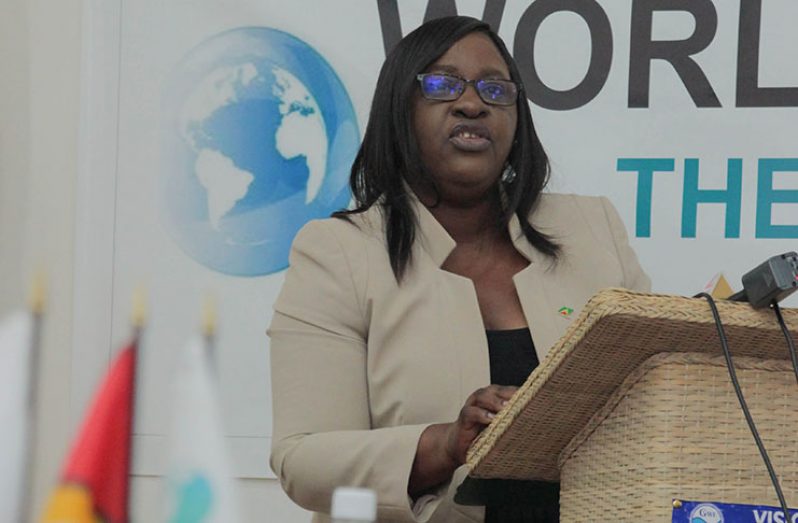IN small communities across Guyana, the potential for outbreaks of wastewater-related illnesses is significant, and to address this, more water and wastewater treatment projects need to be given significant priority.
This is according to junior Public Health Minister, Karen Cummings, on Wednesday at an event to observe World Water Day 2017. The event was held at the Guyana Water Incorporated (GWI) corporate complex on Vlissengen Road. The theme for World Water Day this year is ‘Wastewater’.
The term wastewater applies to water that has been contaminated by human and or industrial activities. In a broad sense, sewage can also be used to mean wastewater. The Minister, who examined issues associated with wastewater, explained that community leaders and residents need to be more aware of potential problems so that strategies could be put in place to counter any potential risks.
She said that rural homeowners need to learn about what is good and bad for their onsite systems, what maintenance is needed, and how to identify possible problems. Additionally, she noted that communities with wells need to be informed about the value of well water testing and be made aware of how to prevent contamination.
Just recently GWI announced its intention to drill water wells at Diamond, Sparendaam and Sophia. Addressing the gathering with included top officials of GWI, the Minister reminded them that what is needed is for the communities to regularly monitor the local water quality since illegally dumped waste can threaten water and groundwater resources.
Minister Cummings also highlighted the need for strategies to be identified to solve local pollution problems, while reminding the attendees that businesses and industries need to be further educated about the health dangers associated with untreated wastewater.
According to her, the health hazards associated with direct and indirect wastewater use are of two kinds. The first, she said, is rural health and safety issues for persons working on land or living on or near the land where the water is being used. And secondly, the risk that contaminated products from the wastewater use area may subsequently infect humans or animals through consumption or handling of the foodstuff or through secondary human contamination by consuming foodstuffs from animals that use the area.
Given the complexity of this issue, which the Ministry and related agencies are working to address, the Minister related that, “This whole concept of wastewater use and its treatment is a work in progress”.
She touched too on the agronomic and economic benefits of wastewater, which were identified by the Food and Agricultural Organisation of the United Nations (FAO). That organisation has shared information which states that irrigation with wastewater can increase the available water supply or release better quality supplies for alternative uses. In addition to these direct economic benefits that conserve natural resources, FAO notes that the fertilizer value of many wastewaters is important.
As a result, the Minister contended that there are “undeniable benefits” from using wastewater in agriculture, and for other alternative activities. However, she was keen to note that if not managed effectively, there are a number of unintended consequences that can occur which negatively impact the health of humans who are exposed to wastewater.
Having acknowledged this, she committed, on behalf of the Ministry to continue to work in a coordinated, collaborative, multidisciplinary way to address any public health issue that may arise as a result of wastewater contamination.



.jpg)








